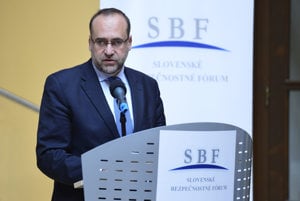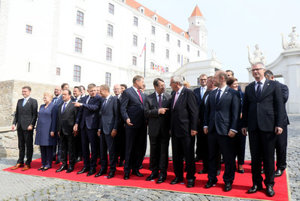The second half of 2016, eventful as it was for Europe and the US, was also Slovakia’s term at the helm of the Council of the European Union. It was the first time Slovakia held the rotating presidency and its performance is generally evaluated as a success.
“It was successful in all dimensions and this success is not confirmed with our statements, but rather by all the top representatives of the EU, EU member states, and, what is important, there have been very positive responses in the media and even the Slovak opposition stated that it was a standard presidency,” Prime Minister Robert Fico summed up as quoted by the SITA newswire.
Among the major results that the prime minister and his Foreign Minister Miroslav Lajčák highlighted as they evaluated the presidency are the passed EU budget for 2017, the deal about the Paris Climate Agreement, the launch of the Frontex border guards, the agreement on free trade with Canada, the digital single market, but also the progress in talks about the European prosecutor.
PRESIDENCY IN NUMBERS
1,212 sessions (all sessions from ministerial councils to meetings of working groups, special presidency events that took place in Bratislava, as well as expert meetings, and the Bratislava summit)
18 ministerial sessions
1 summit of heads of parliaments in Bratislava
700 delegations from 45 countries visited Bratislava
51 ministerial councils in Brussels
250+ cultural events in 30 countries
There are several other, less high-profile agendas that the EU Council passed under Slovakia’s watch, like the deal to scrap roaming fees in the EU as of 2017, the deal on 5G mobile internet, and the deal on removing unjustified geographic blocking, for instance on e-shops, all part of the digital market, said Dušan Chrenek, head of the EC Representation in Slovakia.
Focusing on day-to-day agenda
Radovan Geist, publisher of the Euractiv.sk news portal, agrees that all in all, the presidency may be called successful.
“It certainly helped that during our presidency no serious crisis burst out that we would have had to - and would have been unable to - react to,” Geist told The Slovak Spectator. The situation in the eurozone was relatively calm and the pressure from migration was far from the levels seen in 2015, he noted.
Slovakia’s presidency did not need to deal with any major unexpected problem and was thus able to focus on the working agenda, which led to several successful outcomes, said Vladimír Bilčík, analyst with the non-governmental Slovak Foreign Policy Association (SFPA).
 Javorčík proud of Presidency’s trade achievements Read more
Javorčík proud of Presidency’s trade achievements Read more The success of the Slovak presidency particularly concerns the performance on the diplomatic level, according to Bilčík, who sees the working expectations as mostly having been fulfilled. The expectations were rather low in June, however, due to the Brexit vote and the ongoing lack of a solution to the migration and refugee crisis, he explained.
Effective solidarity - an issue to discuss
While analysts are cautious to applaud the concept of effective solidarity that Slovakia came up with towards the end of its presidency, Fico highlights it as a shift in the approach to migration. The EU needs to work on this concept, otherwise “it will have no effective tool to solve the problems that the migration crisis brings in 2017”, he said on January 2.
 Fico: Slovakia did well presiding over the EU Council Read more
Fico: Slovakia did well presiding over the EU Council Read more Effective solidarity should mean that every member state is required to help but it is up to the member states to decide in what form: money, technology, human resources. Malta and Italy were against the proposal, but Malta, which took over after Slovakia on January 1, pledged to work with the concept.
“The proposal on effective solidarity is basically just a point of discussion and so far there has not been consensus on how to deal with migration in the future in a systematic manner,” Bilčík said and noted that the union remains split over this issue.
Geist opines that the Slovak presidency has focused on restriction and protection measures, like the border guards and sharing of information, but it has not been very active in the discussion about the reform of the Dublin system and the asylum-related legislation.
“Effective common border protection is an essential part of the common migration and asylum policy, but it is by no means a replacement for the mechanism in which the EU countries could redistribute their responsibility for asylum seekers, particularly in the cases when there is a large number of them in one of the member states,” Geist noted.
The summit
The most important result of the presidency is that it started the “Bratislava process”, Fico told the press on January 2.
“I believe the Bratislava process as such has already entered into the modern history of European politics because it has begun the process of EU self-reflection that was needed after the decision of the British voters to leave the EU,” Fico said, as quoted by SITA.
The Bratislava declaration, the Bratislava process or the Bratislava road map are expressions that should be added to the EU vocabulary, according to Fico, though no fundamental agreements were made at the September 16 informal meeting. The so-called Bratislava summit has launched a process that should be completed at next year’s meetings in Malta and Italy.
The Bratislava informal summit of 27, minus Britain, took place during the Slovak presidency. It came in reaction to the Brexit vote in Britain in June, days before Slovakia officially took over as president of the EU Council. Though the EU leaders were to discuss how the Union will operate after Brexit, the main topics concerned security, like the creation of a common army and the protection of borders.
 Bratislava EU summit copes with existential crisis Read more
Bratislava EU summit copes with existential crisis Read more Yet the issue of security and defence did not move significantly forward during Slovakia’s presidency.
“It should be said that it is not completely in the presidency’s hands, but obviously the presidency could have pressed the agenda more,” Bilčík said.
A cloud over the presidency
On the national level, the presidency ended with a stain, after suspicions over murky procurement practices at the Foreign Ministry were voiced by a former ministry staffer.
 Ex-employee points to overpriced presidency-related orders Read more
Ex-employee points to overpriced presidency-related orders Read more As such, the scandal that unfolded after the ministry failed to answer some key questions of Transparency International and of journalists, would be an issue of minor to medium importance, and would hardly attract much attention beyond Slovakia, and “would perhaps even expire quite fast at home too”, Geist said. But the reaction of PM Robert Fico, who at a press conference called journalists “dirty anti-Slovak prostitutes”, added fuel to the flame.
“This case obviously by no means erases any of the things that the presidency did or achieved,” Geist told The Slovak Spectator. “But it confirms the image that our region and its politicians have among many people elsewhere in Europe.”






